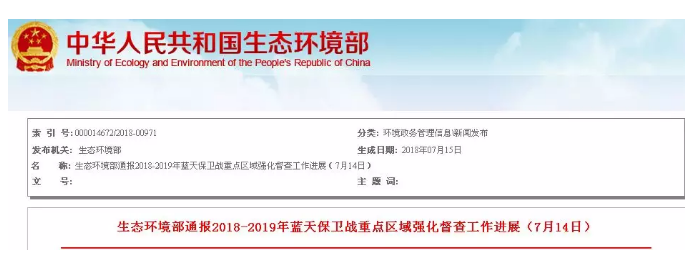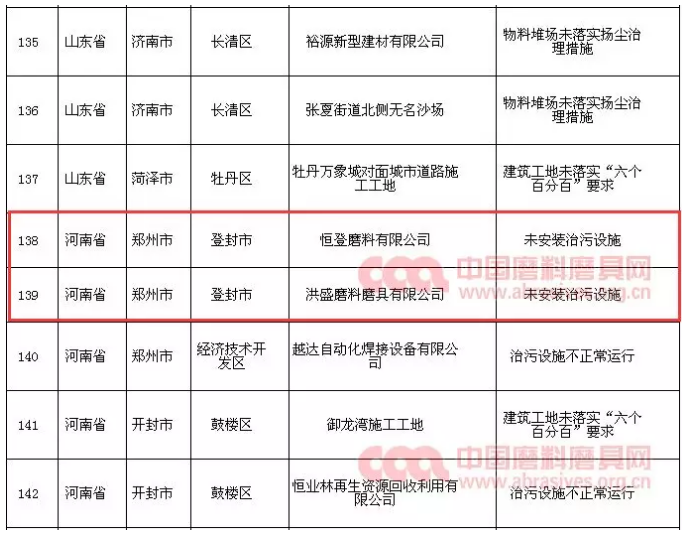Since June 11, the intensive supervision of the key areas of the Blue Sky Defence War in 2018-2019 has officially begun, and 200 inspection teams have supervised the Beijing-Tianjin-Hebei region and surrounding areas in accordance with the requirements of the work plan. For the environmental problems discovered by the inspectors, the Ministry of Ecology and Environment announced on the official website. On July 14, 209 counties (cities, districts) in Beijing, Tianjin and Hebei and surrounding areas were inspected and 164 gas-related environmental problems were found, of which two abrasive companies were notified.


The objectives, main tasks, main tasks, scope, specific time schedules, and working methods of the intensive supervision of the Blue Sky Defence War are answered by the head of the Environmental Supervision Bureau of the Ministry of Ecology and Environment.
Question: What are the goals and main tasks of "Strengthening the Blue Sky Defence Warfare"?
A: This intensive supervision began on June 11, 2018 and lasted until April 28, 2019. The Ministry of Ecology and Environment will arrange about 200 inspection teams for the “2+26†city, and arrange about 90 inspection teams for 11 cities in the plain. Each inspection team consists of 3 people, mainly from the local The environmental protection system and the Ministry of Ecology and Environment directly under the unit. In the first phase, there are more than 200 inspection teams, each with 3-4 people. In the second and third phases, there are more than 290 inspection teams, each with 3-4 people. More than 100 special maneuver groups are reserved. The intensive supervision has used about 18,000 people (times).
Further urge the local party committees and governments at all levels in key areas to implement the responsibility for air pollution prevention and control, and in accordance with the requirements for winning the blue sky defense war, continue to strengthen regional joint prevention and control, deepen comprehensive management, and increase the intensity of various types of gas-related environmental violations. Continue to consolidate the effectiveness of air pollution control and promote the improvement of ambient air quality. Through large-scale, centralized supervision to achieve the purpose of actual training, promote the national ecological environment comprehensive law enforcement team exchanges, improve the level of business capabilities, and build an environmental law enforcement iron army.
Intensive supervision will highlight key areas, key indicators, key time periods and key areas, and focus on four key tasks of industrial structure, energy structure, transportation structure and land use structure, and examine the comprehensive rectification of “scattering and pollution†enterprises and the environmental management of industrial enterprises. 13 inspection tasks such as cleaning and heating and coal replacement.
Question: What is the main work of "Strengthening the Blue Sky Defence Warfare"?
A: This intensive supervision mainly includes several major tasks: comprehensive rectification of “disorganized pollution†enterprises, environmental problems of industrial enterprises, rectification of industrial furnaces, clean heating and coal replacement, coal-fired boilers Remediation situation, adjustment of transportation structure and mode, comprehensive rectification of open pit mines, comprehensive treatment of dust, control of straw ban, implementation of peak production, implementation of emergency measures for heavy pollution, and handling of outstanding environmental problems .
Question: What is the scope of this intensive supervision?
A: (1) Beijing-Tianjin-Hebei and surrounding areas include Beijing, Tianjin, Shijiazhuang, Hebei Province (including Xinji), Tangshan, Baoding (including Dingzhou), Langfang, Zhangzhou, Hengshui, Handan, Xingtai City, Taiyuan, Shanxi Province, Yangquan, Changzhi, Jincheng, Jinan, Zibo, Liaocheng, Dezhou, Binzhou, Jining, Heze, Shandong Province, Zhengzhou (including Gongyi), Xinxiang (including Changchun), Hebi, Anyang (including Huaxian), Jiaozuo Containing Jiyuan), Fuyang, Kaifeng City (including Lankao) (hereinafter referred to as “2+26†city).
(2) 11 cities in the plains include Luliang, Jinzhong, Linyi and Yuncheng in Shanxi Province, Luoyang and Sanmenxia in Henan Province, Xi'an, Xianyang, Baoji, Tongchuan, Weinan and Yangling Demonstration Zones in Shaanxi Province.
(3) The Yangtze River Delta region includes Shanghai, Jiangsu, Zhejiang, and Anhui provinces.
Q: How is the supervision time arranged?
A: The first stage (June 11, 2018 to August 5, 2018), a total of 4 rounds. Implementation of other measures stipulated in the “2+26†city “scattering pollution†enterprise rectification, coal-fired boiler elimination, rectification of the supervision of the Ministry, and the “Action Plan for the Comprehensive Management of Air Pollution in the Beijing-Tianjin-Hebei and Surrounding Regions in the Autumn and Winter of 2017-2018†Carry out "looking back." Sort out the hot grid, the people's complaints and reports, and focus on discovering new gas-related problems.
The second stage (August 20, 2018 to November 11, 2018), a total of 6 rounds. Conduct comprehensive inspections on “2+26†cities and 11 cities in the Plains of the Plains, and investigate problems in industrial furnaces, mines, mines, small thermal power plants, implementation of “transfer ironsâ€, dust control and straw burning. To guide and urge all tasks and measures to be put in place.
The third stage (November 12, 2018 to April 28, 2019), a total of 11 rounds. Focus on supervising the implementation of the autumn and winter emission reduction measures in the “2+26†city, the 11th city in the plain, and the Yangtze River Delta region, and check the implementation of various measures to deal with peak production and heavy pollution.
Each inspection team inspected the site for 2 weeks and arranged a total of 21 rounds of inspections.
The “2+26†city has an overall arrangement of about 200 inspection teams. In the 11 cities of the Plains, there are about 90 inspection teams. The Yangtze River Delta region mainly arranges special operations groups to carry out irregular inspections.
Q: What is the way to strengthen the supervision work?
A: The main methods of strengthening supervision work are:
First, unified dispatching command. The Special Supervision Office of the Ministry of Ecology and Environment (hereinafter referred to as the Special Office) is responsible for command, dispatch, coordination and strengthening supervision.
Second, carry out detailed investigations. Conduct patrol inspections on “2+26†cities and 11 cities (districts and districts) in the plains of the plains, and focus on the problem investigation. For the special operations teams of the four provinces and cities in the Yangtze River Delta region, mobile supervision was carried out to ensure that problems were investigated.
Third, timely delivery of issues. The problems found in the investigation will be reviewed by the special office before the electronic supervision order will be issued. The first time will be pushed to the cities to enhance the timeliness of the delivery. After the end of each round of inspections, a unified supervision letter will be issued after the unified summary, and sent to the relevant people (counties, districts) people's government and management committee, and copied to the relevant provincial people's governments and environmental protection bureaus (bureaus).
Fourth, check the rectification situation. After the completion of the two rounds of supervision, a week is arranged, and the inspection team will check the previous assignments to ensure that the rectification is in place.
5. Implement an open interview. According to the supervision situation, the cities that have concentrated on environmental pollution in industrial enterprises, the overall promotion of air pollution prevention, and the implementation of inadequate responsibility and air pollution problems are listed and supervised or openly interviewed.
Sixth, serious quantitative accountability. For cities with serious air pollution, frequent heavy pollution, and improved environmental quality, the central environmental protection special inspections should be carried out in due course. From the second stage, the Ministry of Ecology and Environment will formulate quantitative accountability measures, improve the rules and strictly implement the various special actions on pollution prevention and control.
HSONG LIGHTING CO,. LTD , https://www.hsonglighting.com